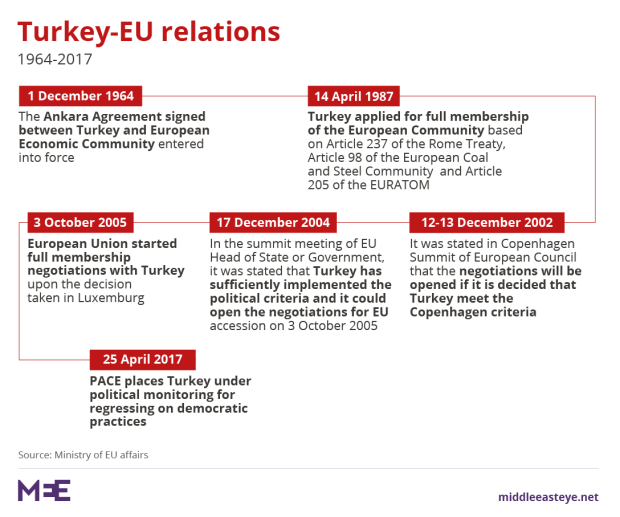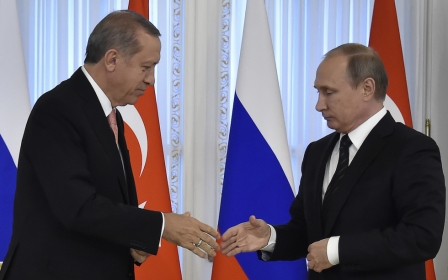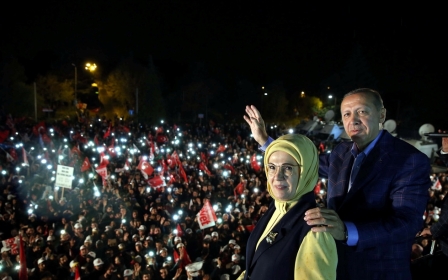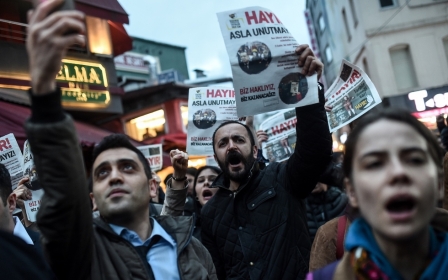Turkey placed on damaging democracy watchlist by EU
Turkey's chances of joining the EU were seriously jeopardised on Tuesday as the statutory organ of the Council of Europe degraded the country's state of democracy, placing it under observation – a major criticism of the regression seen in Turkey's democratic practices during the last few years.
The Parliamentary Assembly of the Council of Europe (PACE) voted 113 to 45 to reopen the monitoring process for Turkey on the basis of investigations into the democratic institutions in Turkey.
Placing Turkey under monitoring means Europe considers Turkey to be non-compliant with the Copenhagen criteria, the rules on governance, economic standards and human rights that determine if a country is eligible to join the EU.
The PACE report stated that Turkey had veered off the democratic path with its purge of state institutions after the failed coup of July 2016. It also expressed concern over human rights violations in terrorism and security-related operations in the country’s southeast.
The report also stated that while it appreciated the impact of last July’s failed coup attempt and Turkey’s ongoing fight against terrorism, the government responses created concern about fundamental rights.
It also criticised the lifting of immunities of MPs and the imprisoning of a number of MPs, and the jailing of journalists in Turkey under its vague anti-terrorism laws.
The decision means Turkey has become the first country to be placed under monitoring for a second time, having previously being under full monitoring from 1996 to 2004.
Ankara condemned the vote as politically motivated. "We strongly condemn it," the foreign ministry said in a statement. "Turkey is fighting various terrorist groups like the PKK and Daesh (Islamic State) at the same time and Turkey's responses are proportionate to the threats.
"This decision is fuelled by the anti-Turkish and Islamophobic sentiment of the populist right in Europe."
Members of the ruling AKP party within the Turkish delegation to PACE had earlier launched a two-pronged attempt to try to prevent the decision.
First, they asked for relevant paragraphs that would place Turkey under observation again to be struck off the text to be voted on. Simultaneously, they also asked for any vote in this regard to be deferred for a year to 2018.
The Council of Europe will decide by the end of the month whether to to continue accession talks with Ankara.
If approved at PACE, the European Council, which decides the EU's overall political direction and priorities, will have to review a request to suspend Turkey's negotiations with the bloc at a summit scheduled for the end of April.
The European Council had decided to postpone a decision on a request to suspend EU accession negotiations with Turkey in a December 2016 summit.
The Turkish government has questioned the EU's sincerity in its dealings with Ankara. Turkish President Recep Tayyip Erdogan has also mentioned on several occasions that Turkey might hold a referendum to decide whether it even wants to join the EU any longer.
New MEE newsletter: Jerusalem Dispatch
Sign up to get the latest insights and analysis on Israel-Palestine, alongside Turkey Unpacked and other MEE newsletters
Middle East Eye delivers independent and unrivalled coverage and analysis of the Middle East, North Africa and beyond. To learn more about republishing this content and the associated fees, please fill out this form. More about MEE can be found here.





